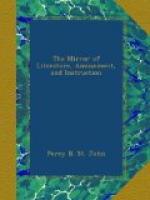Stow says, “that in the moneth of May, the citizens of London, of all estates, lightlie in every parish, or sometimes two or three parishes joyning together, had their severall Mayinges, and did fetch in Maypoles, with divers warlike showes, with good archers, morrice-dancers, and other devices for pastime all the day long, and towards the evening they had stage-playes and bone-fires in the streetes. These greate Mayinges and Maygames, made by governors and masters of this citie, with the triumphant setting up of the greate shafte, (a principall May-pole in Cornhill, before the parish church of S. Andrew, therefore called Undershafte,) by meane of an insurrection of youthes against alianes, on May-day, 1517, have not beene so freely used as afore.”
The disuse of these ancient pastimes and the consequent neglect of Archerie, are thus lamented by Richard Niccols, in his London’s Artillery, 1616:
How is it that our London hath laid downe
This worthy practise, which was once the
crowne,
Of all her pastime which her Robin Hood
Had wont each yeare when May did clad
the wood
With lustre greene, to lead his young
men out,
Whose brave demeanour, oft when they did
shoot,
Invited royall princes from their courts
Into the wilde woods to behold their sports!
Who thought it then a manly sight and
trim,
To see a youth of clene compacted lim,
Who, with a comely grace, in his left
hand
Holding his bow, did take his steadfast
stand,
Setting his left leg somewhat foorth before,
His Arrow with his right hand nocking
sure,
Not stooping, nor yet standing streight
upright,
Then, with his left hand little ’bove
his sight,
Stretching his arm out, with an easie
strength
To draw an arrow of a yard in length.
The lines
“Invited royall princes from their
courts
Into the wilde woods to behold their sports,”
may be reasonably supposed to allude to Henry the VIIIth, who appears to have been particularly attached, as well to the exercise of archery, as to the observance of Maying. “Some short time after his coronation,” says Hall, “he came to Westminster with the quene, and all their traine, and on a tyme being there, his grace, therles of Essex, Wilshire, and other noble menne, to the number of twelve, came sodainly in a mornyng into the quenes chambre, all appareled in short cotes of Kentish kendal, with hodes on their heddes, and hosen of the same, every one of them his bowe and arrowes, and a sworde and a bucklar, like outlawes, or Robyn Hodesmen; whereof the quene, the ladies, and al other there were abashed as well for the straunge sight, as also for their sodain commyng, and after certayn daunces and pastime made, thei departed.”




